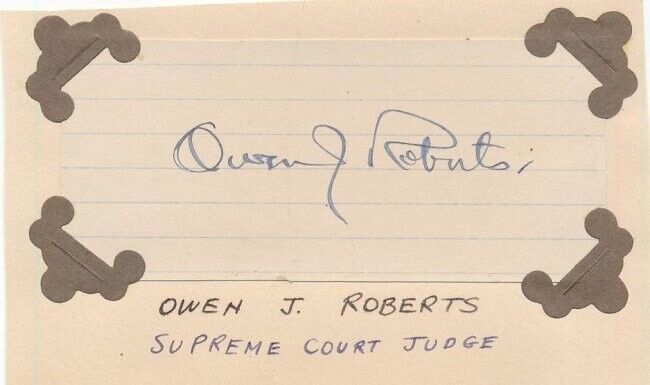|
|
|

|
|

On eBay Now...
Owen Roberts-Historical Signed Page from the 1930s (Supreme Court Justice) For Sale

When you click on links to various merchants on this site and make a purchase, this can result in this site earning a commission. Affiliate programs and affiliations include, but are not limited to, the eBay Partner Network.

Owen Roberts-Historical Signed Page from the 1930s (Supreme Court Justice):
$80.00
Historical 4X1.75 lined page signed in blue fountain pen ink by Owen J. Roberts. Affixed to another card.
(1875-1955) Owen Josephus Roberts was an associate justice of the United States Supreme Court from 1930 to 1945. He also led two Roberts Commissions, the first of which investigated the attack on Pearl Harbor, and the second of which focused on works of cultural value during World War II. Born in Philadelphia, Roberts graduated from the University of Pennsylvania Law School and pursued a legal career. After working as a district attorney in Philadelphia, he was appointed by President Calvin Coolidge to investigate the Teapot Dome scandal. After the death of Associate Justice Edward Terry Sanford in March 1930, President Herbert Hoover nominated John J. Parker to fill the vacancy on the court. The Senate rejected Parker and Hoover quickly nominated Roberts as his second choice for the vacancy. Roberts was easily confirmed and took his position on the court in May 1930.On the Hughes Court, Roberts was a swing vote positioned between the conservative Four Horsemen and the liberal Three Musketeers. Along with Chief Justice Charles Evans Hughes, Roberts\'s vote often decided whether President Franklin D. Roosevelt\'s New Deal legislation would be upheld. His decision to uphold the constitutionality of a state minimum wage law in West Coast Hotel Co. v. Parrish has been called \"the switch in time that saved nine.\" That term references the decision\'s possible role in the defeat of the Judicial Procedures Reform Bill of 1937, which would have expanded the Supreme Court and thus allowed Roosevelt to appoint Justices more sympathetic to his policies. Roberts\'s motivation for upholding the constitutionality of the New Deal and his role in the defeat of the bill remains a matter of debate. Though the bill was defeated, Roosevelt\'s long presidency allowed him to appoint most of the court. By the end of Roberts\'s tenure, he was the lone Supreme Court Justice who was not appointed by Roosevelt. He was one of three Justices, along with Robert H. Jackson and Frank Murphy, to vote against Roosevelt\'s orders for Japanese American internment camps in Korematsu v. United States as well as the lone judge to dissent in the case of Smith v. Allwright, which ruled white primaries unconstitutional.
Comes with a full Letter of Authenticity from Todd Mueller Authentics.


Owen Roberts-Historical Signed Card (Supreme Court Justice) $76.00

Owen Roberts-Historical Signed Page from the 1930s (Supreme Court Justice) $80.00
|
|
|